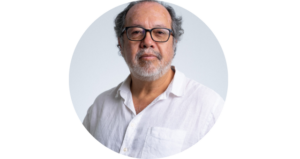
Residence period: March 4th to December 31st, 2024
Volunteer professor at the School of Engineering at UFMG
Francisco de Paula Antunes Lima is a volunteer professor, retired as a full professor at the School of Engineering at the Federal University of Minas Gerais (UFMG). He completed a degree in Mechanical Engineering at UFMG, a master’s degree in the same area, with an emphasis on Design at the Federal University of Santa Catarina (UFSC), and a PhD in Ergonomics (CNAM – Paris). Since the beginning, his academic career has been dedicated to research, intervention and training in the area of occupational health and safety (OSH), with research in accident analysis, skills analysis, tacit knowledge and projects based on operational experience. In addition to theoretical production, he works on knowledge transfer projects to the productive sector, developing intervention methodologies and applied technological projects. He completed two post-doctoral internships, one in Ergology (Université de Provence – France), with a multidisciplinary team of Analysis of Work Situations (APST), another in Ergonomics, at the University of Lyon-II, during which he developed his training in economics. His research activities are structured around three themes: 1) forms of work and production in contemporary capitalism; 2) service activities and organization of public services; 3) territorial development and solidarity economy, economy of functionality and cooperation, innovation and alternative forms of organizing production.
THE SOCIAL FORM OF TECHNOLOGY
Technology, faced with serious social and ecological crises, is the subject of criticism that calls into question both the idea of technical progress and its contribution to human well-being. This project aims to deepen a thesis that lies between technological jingoism and criticism that reduces technology to a simple reflection of interests and power relations. To develop this research, a third way is proposed, which does not disregard the objective basis of domination incorporated in technology, but seeks to recognize the specificity of the technique under the power relations that shape it. This theoretical work allows us to guide practical actions consistent with the social function of technology, thus contributing to building critical engineering. In the field of reflection, the project will deepen the notion of “social form of technology”, based on studies by some authors from the Sociology of Science and Technology (WiebeBjiker, Donald MacKenzie, Latour), from the Ethnography of technology (Pierre Lemonnier) , critical theory of technology (Andrew Feenberg) and Philosophy of Technique (Gilbert Simondon and Bernard Stiegler). In practical terms, this theoretical reflection will serve as guidance for action research projects under development, involving important social issues such as ecological transition, the development of security for high-risk systems and the development of social technologies to support sustainable territorial development.